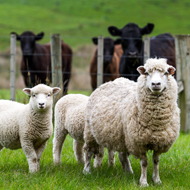UK at risk of a bluetongue outbreak

"The risk of incursion from infected midges is difficult to predict at this stage because it is highly dependent on the level of disease on the continent, the proximity to the UK and the weather."
Defra is urging farmers to be vigilant for signs of bluetongue, after a new report found there is a risk of outbreaks in spring or summer.
Outbreaks are most likely in late summer, as a result of infected midges being blown from France across to the south east of England, according to a risk assessment published by the Animal and Plant Health Agency (APHA).
France reported an outbreak of bluetongue serotype 8 (BTV-8) in September last year - the first known cases in the EU since 2011. There have now been more than 170 outbreaks in the country, according to the risk assessment published last week.
Bluetongue is an illness of ruminants such as sheep, cattle, goats, deer, llamas and alpacas. It does not affect people, meat or any other animal products, including milk.
British farmers are now being urged to monitor their stock carefully for symptoms, and to report any clinical signs of disease to their vet or the APHA immediately.
BVA's senior vice president John Blackwell encouraged farmers to be particularly vigilant when it comes to sheep, which are most susceptible. Symptoms to look out for include eye and nasal discharge, drooling, swelling around the head or mouth, lethargy and lameness.
Farmers have also been advised to speak to their local vet about vaccination, depending on their locality and circumstances, particularly if they are worried about bluetongue.
The government's deputy chief vet, Simon Hall, commented: "We have robust disease surveillance procedures in place and are working closely with the livestock industry to carefully monitor the situation in France where bluetongue disease control measures are in place.
"The risk of incursion from infected midges is difficult to predict at this stage because it is highly dependent on the level of disease on the continent, the proximity to the UK and the weather."
Restriction zones are currently in place in France to control the spread of the disease. Similar steps would be taken - including movement restrictions - if bluetongue were found in this country.
APHA's risk assessment: https://www.gov.uk/government/uploads/system/uploads/attachment_data/file/499882/qra-BTV8-UK-160212.pdf



 The Federation of Independent Veterinary Practices (FIVP) has announced a third season of its podcast, Practice Matters.
The Federation of Independent Veterinary Practices (FIVP) has announced a third season of its podcast, Practice Matters.